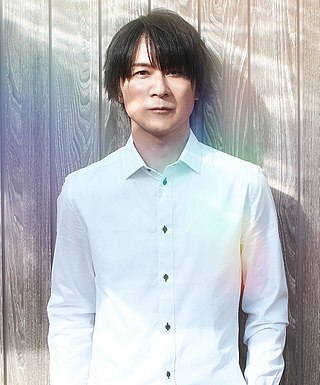
The Chrono series is a video game franchise developed and published by Square Enix. It began in 1995 with the time travel role-playing video game Chrono Trigger, which spawned two continuations, Radical Dreamers and Chrono Cross. The music of Chrono Trigger was mainly composed by Yasunori Mitsuda, with a few tracks composed by regular Final Fantasy composer Nobuo Uematsu. The Chrono Trigger soundtrack has inspired four official album releases by Square Enix: a soundtrack album released by NTT Publishing in 1995 and re-released in 2004, a greatest hits album published by DigiCube in 1999, published in abbreviated form by Tokyopop in 2001, and republished by Square Enix in 2005, an acid jazz arrangement album published and republished by NTT Publishing in 1995 and 2004, and a 2008 orchestral arranged album by Square Enix. Corresponding with the Nintendo DS release of the game, a reissued soundtrack was released in 2009. An arranged album for Chrono Trigger and Chrono Cross, entitled To Far Away Times, was released in 2015 to commemorate the 20 year anniversary of Chrono Trigger.
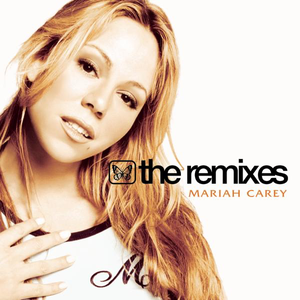
The Remixes is the first remix album by American singer and songwriter Mariah Carey, released on June 25, 2003, by Columbia Records. It is primarily a collection of remixes of some of Carey's songs: disc one is compiled of club mixes, while disc two contains Carey's hip hop collaborations and remixes.
The music of the video game Final Fantasy VI was composed by regular series composer Nobuo Uematsu. The Final Fantasy VI Original Sound Version, a compilation of all the music in the game, was released in Japan by NTT Publishing in 1994 and re-released by Square Enix in 2004. The album was released by Square Co./NTT Publishing in North America in 1994 under the name Kefka's Domain. Selected tracks from the official soundtrack were later released as part of the Music From FFV and FFVI Video Games album that was included with the release of Final Fantasy Anthology, and two EPs were produced containing character theme tracks entitled Final Fantasy VI Stars Vol. 1 and Vol. 2. A special orchestral arrangement of selected tracks from the game, arranged by Shiro Sagisu and Tsuneyoshi Saito, and performed by the Milan Symphony Orchestra, was released under the title Final Fantasy VI Grand Finale by NTT Publishing in 1994 and 2004, and a collection of piano arrangements, arranged by Shirou Satou and performed by Reiko Nomura, was released under the title Piano Collections Final Fantasy VI by Square/NTT Publishing in 1994 and by NTT Publishing in 2001. Additionally, a single containing unused and remixed tracks from the game was released as Final Fantasy VI Special Tracks by NTT Publishing in 1994.

Sharon Jones & the Dap-Kings were an American funk and soul band signed to Daptone Records. They were part of a revival movement of mid-1960s to mid-1970s style funk and soul music. They released their debut album Dap Dippin' in 2002, the first of seven studio albums. Their 2014 album Give the People What They Want was nominated for the Grammy Award for Best R&B Album. Following Sharon Jones' death in 2016, the band released the posthumous album Soul of a Woman in 2017 and a compilation of cover songs in 2020.
The music of the video game Final Fantasy IV was composed by regular series composer Nobuo Uematsu. The Final Fantasy IV Original Sound Version, a compilation of almost all of the music in the game, was released by Square Co./NTT Publishing, and subsequently re-released by NTT Publishing. It was released in North America by Tokyopop as Final Fantasy IV Official Soundtrack: Music from Final Fantasy Chronicles, with one additional track. It has since been re-released multiple times with slight changes as part of the Final Fantasy Finest Box and as Final Fantasy IV DS OST. An arranged album entitled Final Fantasy IV Celtic Moon, containing a selection of musical tracks from the game performed in the style of Celtic music by Máire Breatnach, was released by Square and later re-released by NTT Publishing. Additionally, a collection of piano arrangements composed by Nobuo Uematsu and played by Toshiyuki Mori titled Piano Collections Final Fantasy IV was released by NTT Publishing.

The Chrono series is a video game franchise developed and published by Square Enix. It began in 1995 with the time travel role-playing video game Chrono Trigger, which spawned two continuations, Radical Dreamers and Chrono Cross. The music of Chrono Cross was composed by Yasunori Mitsuda, the main composer of Chrono Trigger and Radical Dreamers. Chrono Cross has sparked a soundtrack album, released in 1999 by DigiCube and re-released in 2005 by Square Enix, and a greatest hits mini-album, published in 2000 by Square along with the North American release of the game. Radical Dreamers, the music of which heavily inspired the soundtrack of Chrono Cross, has not sparked any albums, though some songs from its soundtrack were reused in Chrono Cross. An album of arrangements of Chrono Cross songs was first announced by Mitsuda in 2005, and later intended to be released to coincide with the tenth anniversary of the game in 2009; its release date was pushed back several times since then. In 2015, Mitsuda released an album of arranged music from Chrono Trigger and Chrono Cross entitled To Far Away Times to commemorate the 20-year anniversary of Chrono Trigger.
The music for the 2013 action role-playing game Lightning Returns: Final Fantasy XIII, developed and published by Square Enix, was composed by Masashi Hamauzu, Naoshi Mizuta, and Mitsuto Suzuki. Hamauzu was the leader composer for XIII and XIII-2, and Mizuta and Suzuki previously composed music for XIII-2. Musicians who had previously worked with the composers on XIII-2 and The 3rd Birthday worked on the project in Japan, while the main soundtrack was performed and recorded in Boston by the Video Game Orchestra, conducted by Shota Nakama. Along with including more percussion and ethnic elements, the soundtrack used "Blinded by Light", the main theme for main character Lightning, as a leitmotif. Unlike the previous XIII games, the soundtrack did not include a theme song, as the composers felt it would detract from the emotional impact of the ending.
Yūsuke Kawai, known professionally as Tofubeats, is a Japanese singer, record producer, and DJ.
Trevor Something is the alias of Clayton Bullard, an American musician known for creating synthwave music. He creates both original music as well as remixed music through the sampling and mixing of music by other artists.
Since the mid-2000s, a counterculture has taken place where numerous netlabels, online labels that release their music for free, located in Japan have been formed and garnered a huge amount of publicity which, according to writer Patrick St. Michel, has shaped how popular Japanese music is produced. Japan's netlabel phenomenon was the first time in the history of the nation's music industry where underground musicians could produce their works however they wanted to and have their music noticed by the public; this is an aspect that was previously absent at a time when major labels in the country followed a conservative method where they managed how artists would produce their music. Starting in the 2010s, the netlabel scene has crossed over to the mainstream music landscape and all across the world, with netlabel producers transitioning into working for bigger labels and western producers like Cashmere Cat and Ryan Hemsworth being influenced by the music of Japanese netlabels.

"Watashi ga Obasan ni Natte mo" is the 16th single by Japanese singer/songwriter Chisato Moritaka. The lyrics were written by Moritaka and the music was composed by Hideo Saitō. The single was released by Warner Music Japan on June 25, 1992.

"The Stress" is the sixth single by Japanese singer/songwriter Chisato Moritaka. The lyrics were written by Moritaka and the music was composed by Hideo Saitō. The single was released by Warner Pioneer on February 25, 1989. The full title of the single is "The Stress -Stress Chūkintō Version-", a remix of "Stress" with Middle Eastern-style synthesizer arrangements.

"La La Sunshine" is the 29th single by Japanese singer/songwriter Chisato Moritaka. The lyrics were written by Moritaka and the music was composed by Hiromasa Ijichi. The single was released by One Up Music on June 10, 1996. The song was used as the opening and ending theme of Fuji TV's news magazine program Mezamashi TV from April 1, 1996 to March 28, 1997. The single was re-released by zetima on April 16, 2008 with a bonus DVD containing the music video to coincide with the song's use by Kao Corporation for a Blaune hair coloring commercial featuring Moritaka.
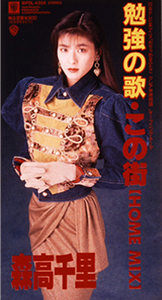
"Benkyō no Uta" is the 12th single by Japanese singer/songwriter Chisato Moritaka. The lyrics were written by Moritaka and the music was composed by Hideo Saitō, the single was released alongside "Kono Machi " by Warner Pioneer on February 10, 1991. The song was used as the opening theme of the 1991 anime TV series Mischievous Twins: The Tales of St. Clare's.
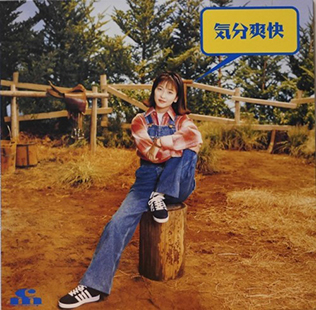
"Kibun Sōkai" is the 22nd single by Japanese singer/songwriter Chisato Moritaka. Written by Moritaka and Kenichi Kurosawa, the single was released by One Up Music on January 31, 1994. The song was used by Asahi Breweries for commercials promoting Asahi Z beer.

Moritaka Tofu (森高豆腐) is a remix album by Japanese singer/songwriter Chisato Moritaka and DJ tofubeats, released on December 17, 2014 by Warner Music Japan. The album features remixes of Moritaka's hit songs and new tracks composed by tofubeats. To promote the album, the duo hosted the "Don't Stop The Music" First Album "Special Night @ WOMB" show in Shibuya on its release date.

Reflection is the sixth studio album by Japanese producer tofubeats, released on May 18, 2022 through Warner Music Japan subsidiary unBORDE. The album is his fifth on a major label. It peaked at 14 on the Japanese Oricon charts.
Pasocom Music Club is a Japanese synth-pop duo, formed in 2015 by Aoi Shibata and Masato Nishiyama. The group started by posting songs to Soundcloud, before making their debut with the EP "Park City", released on Maltine Records in 2017. They have composed songs for multiple television shows, including Yurei Deco and Pokémon Journeys: The Series.
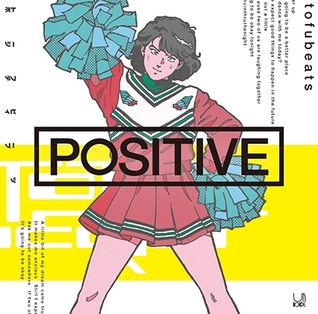
Positive is the third studio album by Japanese producer tofubeats, and his second on a major label. It was released on September 16, 2015, through Warner Music Japan subsidiary unBORDE.

Run, stylized as RUN, is the fifth studio album by Japanese producer tofubeats, and his fourth on a major label. It was released on October 3, 2018, through Warner Music Japan subsidiary unBORDE.












